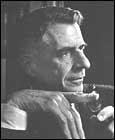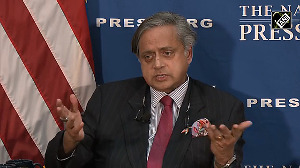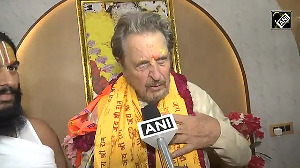Professor John Kenneth Galbraith looms large over the tumultuous period in the Indo-US relations of 1962-63 -- and not just because he is 6'11".
 His rapport with then President John F Kennedy was such that he regularly bypassed the State Department and sent his diplomatic cables directly. Chance also played its role, as he candidly admitted, since the Sino-Indian border war of 1962 coincided with the far graver Cuban missile crisis, and Kennedy was quite content to leave that war in his ambassador's competent hands.
His rapport with then President John F Kennedy was such that he regularly bypassed the State Department and sent his diplomatic cables directly. Chance also played its role, as he candidly admitted, since the Sino-Indian border war of 1962 coincided with the far graver Cuban missile crisis, and Kennedy was quite content to leave that war in his ambassador's competent hands.
In the first week of June while studying archival material on the Indo-US relations at the John F Kennedy Center in Washington, DC, the director there suggested I meet the professor emeritus. I jumped at the opportunity to meet an eyewitness to those events.
As I made my way to Roosevelt House, which is also the name of the US embassy building in New Delhi, on Francis Avenue on the Harvard University campus, I was a bit apprehensive. My guess was age would have taken its toll on the sharp intellect of the 95-year-old professor. I reconciled myself to the idea of meeting an old person with failing memory and faculties.
All my doubts vanished the moment I heard a booming voice invite me, 'Come on in, colonel.' I was already at ease after a frail but gracious Mrs Galbraith received me at the entrance. When I found the crossed khukris of the Gorkha Regiment on the front door, I could not help point out to the lady I belonged to the 9 Gorkhas.
As she took me up the stairs, Mrs Galbraith explained the friend who had presented it to her told her the khukri on top represented her, Mrs Galbraith, since she 'commanded' her husband.
Without much ado, the professor launched into his lecture. Aware I was studying the events related to the Sino-Indian war, he said it was an accidental conflict over a totally useless piece of land and pleaded I should not unnecessarily highlight the China-India differences. "Inventive journalism is a great danger to mankind," he said.
In the course of our conversation, he often repeated a phrase, "Even a bad peace is better than a good war," as he pointedly referred to the recent war on Iraq.
Remembering the 1960s, he said his involvement with India began in 1958-59, while in Switzerland working on his book -- initially titled Why The Poor Are Poor but later changed to The Affluent Society at his wife's suggestion. He met Professor P C Mahalanabis, India's chief economic planner. Professor Mahalanabis told him then prime minister Jawaharlal Nehru had requested then US president Dwight D Eisenhower the services of an economic expert to help with India's planning. Mahalanabis said Eisenhower had suggested Professor Milton Friedman, the guru of free markets. Professor Galbraith laughingly recalled his response to that: "That would be like asking the Pope for consultancy on birth control!"
Nevertheless, Professor Galbraith interrupted his work and came to India for three months and worked with the Planning Commission on problems related to Indian agriculture. Professor Galbraith was essentially an agronomist by
training, not an economist.
In 1960, when Kennedy won the election he offered the ambassador's job to the professor. Going over the events of the 1962 India-China war, Professor Galbraith said he virtually ran the show since JFK was fully occupied in tackling the missile crisis with the Soviet Union. "But for this I would have not been able to play such a major role," he said.
When the issue of military aid came up, Professor Galbraith said, he told Nehru the perpetual America-baiter V K Krishna Menon, then defence minister, had to go before aid could begin to flow. He narrated a story of some US
senators who called on then Indian President Dr Sarvepalli Radhakrishnan during those days of active conflict.
During the course of the conversation, a senator asked Dr Radhakrishnan about the rumour then floating in Delhi that General B M Kaul, the architect of the 1962 military disaster, had been captured by the Chinese. Professor Galbraith, with obvious glee, recalled the Indian President's deadpan reply: 'Unfortunately, it is not true.'
Turning to the issues of war and peace, Professor Galbraith felt many conflicts were essentially a "recreational" activity of the professional military, bored by a long peace. "It [war] also helps employment."
He said 1963 saw the beginning of the American involvement in Vietnam and Kennedy had deliberately sent him to India knowing fully well he would not support American involvement there. But before Kennedy could act, he fell to
assassin's bullets, Professor Galbraith said.
"In the old days, land was important as the giver of all things," he said. "That period is gone now. Technology and brainpower are all that matters and yet conflicts over land, specially one like on the India-China border, that yields nothing, continue. This is a burden of ancient history that we continue to carry. If tomorrow there is settlement on planet Mars, we will begin to worry if others are interested."
On being told of the food mountain of 60 million tonnes India has now, he mentioned that in the 60s itself he had predicted one day India would be Asia's breadbasket.
"Agriculture is one economic activity that does not obey the laws of demand and supply," he said.
India's advance in IT today also owes a debt to Professor Galbraith -- he began the first computer science department, at IIT Kanpur. But he regretted the current scene, where students catch the first flight to the US as soon as they qualify.
It was over an hour now and I was feeling uneasy for the strain I was causing him. His nurse came in just then, for his daily check-up. Reluctantly, the good professor bid me adieu.
As Mrs Galbraith escorted me downstairs, she proudly showed me her collection of Indian miniatures and other knick-knacks. Then pointing at the chairs in the lawn, she mentioned they hold a garden party for all Indian students at Harvard every graduation day. Just the previous day they had held one such.
As I left Roosevelt House, I remembered Professor Galbraith's dry wit, and chuckled to myself. Writing his final report to Kennedy July 9, 1963, he had written he was able to achieve much in this 'complicated part of the world' because he had the president's full backing.
Commenting on the State Department he remarked, it 'considers foreign policy something which is to be conducted for the convenience and enjoyment of people in Washington' and had pleaded for strong leadership and personal attention to India in the long-term interests of the US.
ALSO READ:
External Link: An Interview with J K Gabraith





